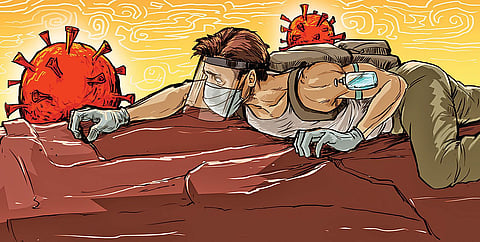

Humanity is going through unprecedented times. The coronavirus has killed more than half-a-million people in six-and-a-half months and has infected almost 1.3 crore people so far.
The WHO predicts that there would be no return to the ‘old normal’ in the foreseeable future. The US, Brazil and India are now reporting the fastest rise in number of infected cases.
COVID-19 has torn the usual safety nets of our society into shreds. Religious institutions remain closed, congregations are banned, pilgrimages have been halted, schools have gone online, and even the minor pleasures of eating out, watching films or going for a vacation are no longer available.
Work has invaded homes relegating the much-fought and won work-life balance to tatters. At the risk of sounding patronising and elitist, here are a few suggestions that may perhaps help the middle class cope with these tough times.
As the situation is unfolding, one thing is getting clearer: this is going to be a long-drawn battle. There is only so much the government, or any institution can do.
Of course, arguments like the situation could have been handled better or there was much left to be desired in the health infrastructure of our country and all such are valid and equally irrelevant now.
It is becoming clearer that we will have to fend for ourselves and as the pandemic peaks, the health system may reach a breaking point.
The economic fallout of this pandemic is going to dwarf anything that has happened in our living memory.
It is not the first time that humanity has faced such defining moments. Pandemics, famines and wars have always been a part of human history.
We have grown complacent in the last five decades or so due to the technological advancement we made.
But Nature loves putting us in our place, and this is such a moment. Accept things are not going back to normal, anytime soon. It is going to get worse before it becomes better. The only thing we can do is to make the best of a horrible situation.
Check your finances and prepare for the worst. It is not negative thinking but prudence. Is your health insurance up to date? Do you have enough life insurance coverage?
Are you paying more interest than the market rate? Can you get refinancing to decrease the EMI burden? Are you prepared for a job loss or temporary business closure? Draw up a back-up plan, including relocation in case of a worst-case scenario.
With education moving online and many jobs moving away from the cities to work from home, it may perhaps be possible to move back to less expensive cities or your native town without compromising the education of your children.
Do you need that city home for which you are paying a huge rental when you can do the same job from a smaller town at quarter the price?
If you are not thinking about such movements, understand that many companies are thinking about vacating the high-rental places in big metros and allow the employees to work from distant locations.
Such a movement would have a ripple effect. Cabs, real estate, malls, travel—everything will be impacted by this ‘new normal’.
In the long run, it would be good for the country as more small towns will develop in the hinterland and take away the pressure from our crowded cities. But in the interim, the change is going to be painful for many. How prepared are you for such a tectonic shift?
Keeping one’s sanity and dealing with depression is going to be one of the greatest challenges that we are going to face.
Locked up in their homes, many are already developing symptoms of depression. The effect of the lockdown is more on children and the elderly.
This is the time to stand with your loved ones. Call up old friends and forgotten relatives, set up video meetings, if possible.
This is the time for self-improvement and to keep an optimistic view of life. Check out the less fortunate people who have already lost their livelihood—the street vendor from who you used to haggle for vegetables, the maid and house workers if you had any. Lending a helping hand at this time would go a long way.
The cycle of goodwill and compassion needs to be kept running. The only way to survive is to stick together, remembering we have only ourselves to depend on.
The politicians are busy toppling governments or saving them and diverting our attention to irrelevant issues.
It is best to ignore their antics and concentrate on our survival. We have survived invasions, famine, colonialism, wars and epidemics many times. We will survive this too, and will emerge stronger.